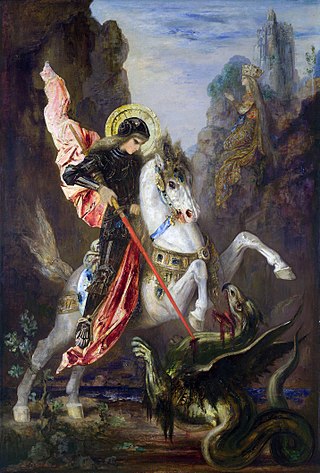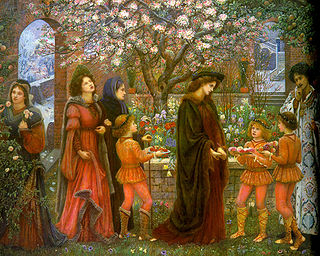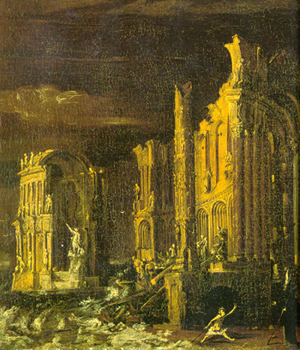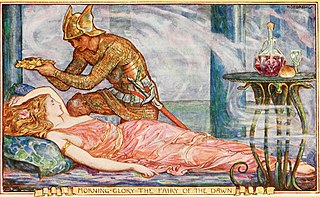Related Research Articles

Christian mythology is the body of myths associated with Christianity. The term encompasses a broad variety of legends and narratives, especially those considered sacred narratives. Mythological themes and elements occur throughout Christian literature, including recurring myths such as ascending a mountain, the axis mundi, myths of combat, descent into the Underworld, accounts of a dying-and-rising god, a flood myth, stories about the founding of a tribe or city, and myths about great heroes of the past, paradises, and self-sacrifice.
Religion and mythology differ in scope but have overlapping aspects. Both are systems of concepts that are of high importance to a certain community, making statements concerning the supernatural or sacred. Generally, mythology is considered one component or aspect of religion. Religion is the broader term: besides mythological aspects, it includes aspects of ritual, morality, theology, and mystical experience. A given mythology is almost always associated with a certain religion such as Greek mythology with Ancient Greek religion. Disconnected from its religious system, a myth may lose its immediate relevance to the community and evolve—away from sacred importance—into a legend or folktale.
The Wold Newton family is a literary concept derived from a form of crossover fiction developed by the American science fiction writer Philip José Farmer. In two of his fictional biographies, Farmer speculated that a meteorite that fell near Wold Newton, Yorkshire, England, in 1795 caused genetic mutations in the occupants of two passing carriages, gifting many of their descendants with extraordinary intelligence and strength. These descendants supposedly include famous fictional characters such as Tarzan, Sherlock Holmes, and Phileas Fogg, among others. The Wold Newton Universe (WNU), an expansion of this concept coined by Win Scott Eckert, extends the concept to include more fictional characters in this shared universe, even if they are not necessarily descendants of the original families. The WNU concept has been incorporated into various literary works and media by Eckert and other authors.

A fictional universe is the internally consistent fictional setting used in a narrative work or work of art, most commonly associated with works of fantasy and science fiction. Fictional universes appear in novels, comics, films, television shows, video games, art, and other creative works.
A parallel universe, also known as a parallel dimension, alternate universe, or alternate reality, is a hypothetical self-contained plane of existence, co-existing with one's own. The sum of all potential parallel universes that constitute reality is often called a "multiverse".

A narrative, story, or tale is any account of a series of related events or experiences, whether nonfictional or fictional. Narratives can be presented through a sequence of written or spoken words, through still or moving images, or through any combination of these. The word derives from the Latin verb narrare, which is derived from the adjective gnarus. Narration is a rhetorical mode of discourse, broadly defined, is one of four rhetorical modes of discourse. More narrowly defined, it is the fiction-writing mode in which a narrator communicates directly to an audience. The school of literary criticism known as Russian formalism has applied methods that are more often used to analyse narrative fiction, to non-fictional texts such as political speeches.
Comparative mythology is the comparison of myths from different cultures in an attempt to identify shared themes and characteristics. Comparative mythology has served a variety of academic purposes. For example, scholars have used the relationships between different myths to trace the development of religions and cultures, to propose common origins for myths from different cultures, and to support various psychoanalytical theories.

Scientology founder L. Ron Hubbard explicitly compared his teachings to the science-fiction subgenre space opera. In his writings, wherein thetans were reincarnated periodically over quadrillions of years, retaining memories of prior lives, to which Hubbard attributed complex narratives about life throughout the universe. The most controversial of these myths is the story of Xenu, to whom Hubbard attributed responsibility for many of the world's problems.
The mythology of the Stargate franchise is the historical backstory of the Stargate premise, which centers around xeno-mythology as experienced by humans during episodic contact. In the fictional universe of the franchise, the people of Earth have encountered numerous extraterrestrial races on their travels through the Stargate.
Worldbuilding is the process of constructing a world, originally an imaginary one, sometimes associated with a fictional universe. Developing an imaginary setting with coherent qualities such as a history, geography, and ecology is a key task for many science fiction or fantasy writers. Worldbuilding often involves the creation of geography, a backstory, flora, fauna, inhabitants, technology and often if writing speculative fiction, different races. This may include social customs as well as invented languages for the world.

A magician, also known as an enchanter/enchantress, mage, magic-user, archmage,sorcerer/sorceress, spell-caster, warlock, witch, or wizard, is someone who uses or practices magic derived from supernatural, occult, or arcane sources. Magicians are common figures in works of fantasy, such as fantasy literature and role-playing games, and enjoy a rich history in mythology, legends, fiction, and folklore.

A fictional city refers to a town, city or village that is invented for fictional stories and does not exist in real life, or which people believe to exist without definitive proof, such as Plato's account of Atlantis.
Traditional stories, or stories about traditions, differ from both fiction and nonfiction in that the importance of transmitting the story's worldview is generally understood to transcend an immediate need to establish its categorization as imaginary or factual. In the academic circles of literature, religion, history, and anthropology, categories of traditional story are important terminology to identify and interpret stories more precisely. Some stories belong in multiple categories and some stories do not fit into any category.
A shared universe or shared world is a fictional universe from a set of creative works where more than one writer independently contributes a work that can stand alone but fits into the joint development of the storyline, characters, or world of the overall project. It is common in genres like science fiction. It differs from collaborative writing in which multiple artists are working together on the same work and from crossovers where the works and characters are independent except for a single meeting.

Fiction is any creative work, chiefly any narrative work, portraying individuals, events, or places that are imaginary, or in ways that are imaginary. Fictional portrayals are thus inconsistent with history, fact, or plausibility. In a traditional narrow sense, "fiction" refers to written narratives in prose – often referring specifically to novels, novellas, and short stories. More broadly, however, fiction encompasses imaginary narratives expressed in any medium, including not just writings but also live theatrical performances, films, television programs, radio dramas, comics, role-playing games, and video games.

Fan fiction or fanfiction is fictional writing written in an amateur capacity by fans, unauthorized by, but based on an existing work of fiction. The author uses copyrighted characters, settings, or other intellectual properties from the original creator(s) as a basis for their writing. Fan fiction ranges from a couple of sentences to an entire novel, and fans can retain the creator's characters and settings and/or add their own. It is a form of fan labor. Fan fiction can be based on any fictional subject. Common bases for fan fiction include novels, movies, musical groups, cartoons, anime, manga, and video games.

Fantasy is a genre of speculative fiction involving magical elements, typically set in a fictional universe and usually inspired by mythology and folklore. The term "fantasy" can also be used to describe a "work of this genre", usually literary.
Myth is a folklore genre consisting of narratives that play a fundamental role in a society, such as foundational tales or origin myths. Since "myth" is popularly used to describe stories that are not objectively true, the identification of a narrative as a myth can be highly controversial. Many religious adherents believe that the narratives told in their respective religious traditions are historical without question, and so object to their identification as myths while labelling traditional narratives from other religions as such. Hence, some scholars may label all religious narratives as "myths" for practical reasons, such as to avoid depreciating any one tradition because cultures interpret each other differently relative to one another. Other scholars may abstain from using the term "myth" altogether for purposes of avoiding placing pejorative overtones on sacred narratives.

The following outline is provided as an overview of and topical guide to fantasy:

Space travel, or space flight is a classic science-fiction theme that has captivated the public and is almost archetypal for science fiction. Space travel, interplanetary or interstellar, is usually performed in space ships, and spacecraft propulsion in various works ranges from the scientifically plausible to the totally fictitious.
References
- ↑ Delasara, Jan (200). PopLit, PopCult and The X-Files: A Critical Exploration. McFarland. p. 39.
- 1 2 Peretti, Daniel (2009). The Modern Prometheus: The Persistence of an Ancient Myth in the Modern World, 1950 to 2007. Indiana University. p. 13.
- ↑ Sepinwall, Alan (2013). The Revolution Was Televised. Simon & Schuster. p. 15.